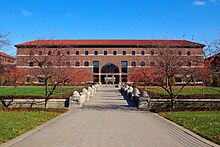Purdue University College of Engineering

MSEE Building
|
|
| Established | 1874 |
|---|---|
| Dean | Leah H. Jamieson |
|
Academic staff
|
339 |
| Undergraduates | 6,139 |
| Postgraduates | 2,211 |
| Location |
|
| Affiliations | Purdue University |
| Website | engineering.purdue.edu |
Coordinates: 40°25.86′N 86°54.87′W / 40.43100°N 86.91450°W
The Purdue University College of Engineering is one of eight major academic divisions, or colleges, of Purdue University. Established in 1874 with programs in Civil and Mechanical Engineering, the college now offers B.S., M.S., and Ph.D. degrees in more than a dozen disciplines. Purdue's engineering program has also educated 22 of America's astronauts, including Neil Armstrong and Eugene Cernan who were the first and last astronauts to have walked on the moon, respectively. Many of Purdue's engineering disciplines are recognized as top-ten programs in the U.S. The college as a whole is currently ranked 9th in the U.S. of all doctorate-granting engineering schools by U.S. News & World Report.
The College of Engineering contains ten Schools, one Department, and three Divisions:
Neil Armstrong Hall of Engineering, named after Neil Armstrong, is the flagship of the College of Engineering and home to its administrative offices, the School of Aeronautics and Astronautics, the School of Materials Engineering, Engineering Projects In Community Service (EPICS), Engineering Education, the Minority Engineering Program, and the Women in Engineering Program. Many other campus buildings house faculty offices, classrooms, and laboratories for engineering programs, such as the Martin C. Jischke Hall of Biomedical Engineering, the Forney Hall of Chemical Engineering, and Potter Engineering Center.
...
Wikipedia
